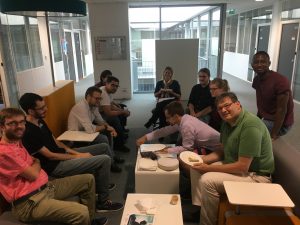Links is a research team of Inria Lille, the University of Lille, and the CNRS (Cristal Lab).
| Links' News |   |
| 2023 | |
|---|---|
Tue 2nd May all day | Charles paper accepted at ASPLOS 24 [ zimbra.inria.fr/zimbra.....h.pdf | Supporting Descendants in SIMD-Accelerated JSONPath ] |
| 2022 | |
Mon 20th Jun 9:00 am 9:30 am | MFCS paper accepted MFCS'22 paper accepted "Weighted Counting of Matchings in Unbounded-Treewidth Graph Families", Antoine Amarilli and Mikaël Monet. Arxiv link: arxiv.org/abs/2205.00851 |
Tue 17th May 9:00 am 10:00 am | Corentin Barloy and Charles Paperman paper accepted @ LICS: The Regular Languages of First-Order Logic with One Alternation Link to the paper arxiv.org/abs/2203.06075 |
Tue 29th Mar to Fri 1st Apr all day | Journées Nationales du GDR IM 2022 Co-organiser par Sophie Tison. Charles Paperman is invited speaker |
Tue 15th Mar all day | ICLP'2022 paper accected Jumping Evaluation of Nested Regular Path Queries. Joachim Niehren, Rustam Azimov, and Sylvain Salvati |
Mon 17th Jan 1:00 pm 2:15 pm | ICDT'2022 best newcomer award for Capelli, Crosetti, Niehren & Ramon: Linear Programs with Database Queries hal.inria.fr/hal-01981553 |
| 2021 | |
Sat 18th Dec 9:45 am 10:45 am | Sigmod paper of Mikael Monet on Shapley values accected. |
Sat 18th Dec 9:00 am 10:00 am | Paper accecpted at VLDB'22 by Slawek Staworko on Threshold queries |
Thu 16th Dec 10:00 am 1:00 pm | Soutenance de Paul Gallot The most recent version of the abstract is included in the PhD Manuscript available at chercheurs.lille.inria......t.pdf |
Wed 1st Dec 1:15 pm 2:15 pm | ICDT'2022 paper accepted by Capelli, Crosetti, Niehren & Ramon: Linear Programs with Database Queries |
Team presentation
The appearance of linked data on the web calls for novel database management technologies for linked data collections. The classical challenges from database research need to be now raised for linked data: how to define exact logical queries, how to manage dynamic updates, and how to automatize the search for appropriate queries. In contrast to mainstream linked open data, the LINKS project will focus on linked data collections in various formats, under the assumption that the data is correct in most dimensions. The challenges remain difficult due to incomplete data, uninformative or heterogeneous schemas, and the remaining data errors and ambiguities. We will develop algorithms for evaluating and optimizing logical queries on linked data collections, incremental algorithms that can monitor streams of linked data and manage dynamical updates of linked data collections, and symbolic learning algorithms that can infer appropriate queries for linked data collections from examples.
Research themes
We will develop algorithms for answering logical querying on heterogeneous linked data collections in hybrid formats, distributed programming languages for managing dynamic linked data collections and workflows based on queries and mappings, and symbolic machine learning algorithms that can link datasets by inferring appropriate queries and mappings. Our main objectives are structured as follows:
- Querying heterogeneous linked data. We will develop new kinds of schema mappings for semi- structured datasets in hybrid formats including graph databases, rdf collections, and relational databases. These induce recursive queries on linked data collections for which we will investigate evaluation algo- rithms, static analysis problems, and concrete applications.
- Managing dynamic linked data. In order to manage dynamic linked data collections and workflows, we will develop distributed data-centric programming languages with streams and parallelism, based on novel algorithms for incremental query answering, will study the propagation of updates of dynamic data through schema mappings, and will investigate static analysis methods for linked data workflows.
- Linking graphs. Finally, we will develop symbolic machine learning algorithms, for inferring queries and mappings between linked data collections in various graphs formats from annotated examples.
International and industrial relations
- Stream Processing: QuiXTools (with Innovimax)
- FUI Hermes



